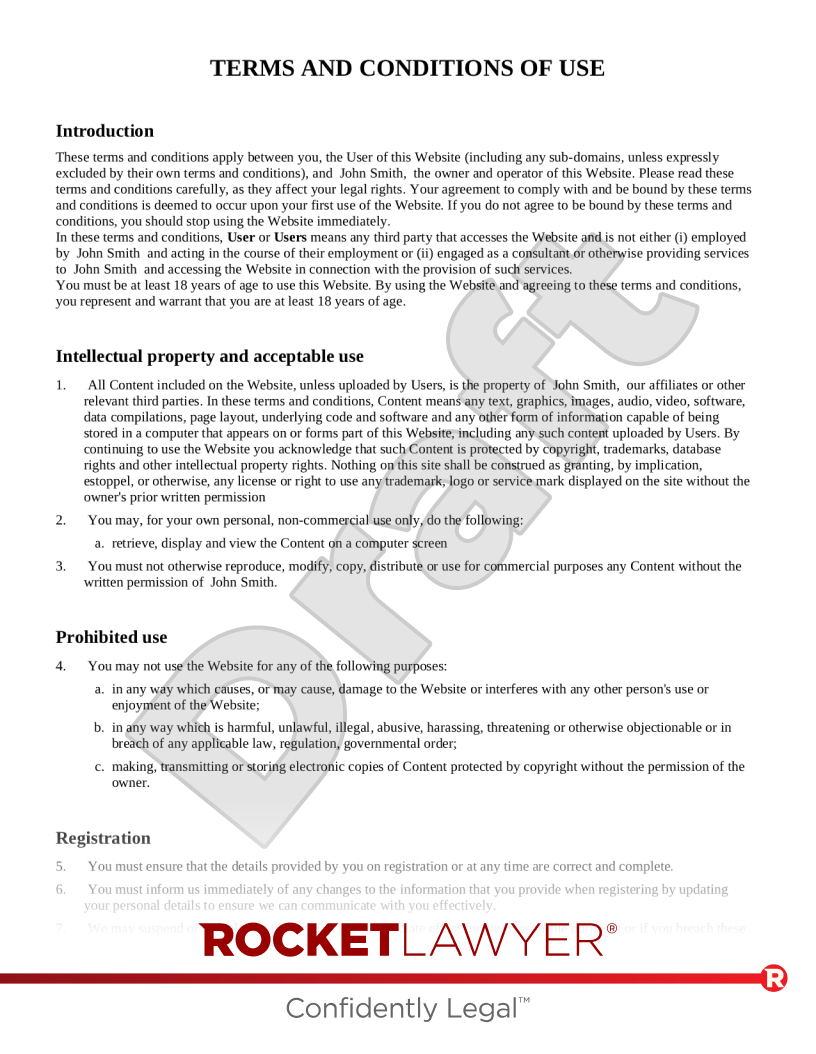What are domain names and how are they registered?
What is a domain name?
The domain name is an integral part of every website and choosing the right name can be more important than the business name. The domain is the first part of every URL in the address bar of the browser (eg 'rocketlawyer.co.uk'). There are two elements to each domain name:
- the name itself (ie 'rocketlawyer'), and
- the suffix (ie '.co.uk'), which is often used to indicate the geographical location or nature of the business
How to register a domain name?
Anyone can register a domain name that has not already been registered, by paying a domain name registration company (eg www.123-reg.co.uk or www.1and1.co.uk) to register it with the relevant domain name authority (eg for domains that use a '.uk' suffix this is Nominet).
Domain names are normally registered for one or two years and renewed before the registration period expires. If they are not renewed, they become available for registration by a different business or individual.
If a domain name has already been registered, it can be purchased privately and then transferred across to the purchaser. However, this is generally more expensive, particularly as many businesses register attractive domains in order to make a profit by selling them (see ‘What is cybersquatting?’ for more information).
Are domain names intellectual property?
Domain names are not typically considered to be intellectual property (IP). Domain names grant their owner the right to use that domain for the duration of their contract with the register. However, much like IP, domain names are considered non-physical assets with their own economic value.
Is a domain name separate from a webspace?
Domain names are completely separate from the rest of the website. All the contents of a website (eg text, images, menu and e-commerce functionality) are hosted on a webspace provided by a web hosting business. Many of these businesses also provide domain name services.
What are the legal issues which can arise regarding domain names?
Passing off
If a business registers a domain name in order to try and gain trade by making customers believe they are associated with a separate business, this is known as passing off. To establish passing off, three factors must be present:
- a good trading reputation must have been built up in the particular name by the separate business
- there must be a misrepresentation to make the public believe the domain name is associated with the separate business
- some kind of damage has been caused (eg loss of profits)
For more information, read Trade marks and passing off.
Trade mark infringement
If the domain name is similar or identical to a registered trade mark, the trade mark owners may be able to prevent its use by a third party. However, they would also need to prove that this has been detrimental to the trade mark or given an unfair advantage to the third party. For more information, read Trade marks and passing off.
Defamation
If a website uses a domain name in order to damage the reputation of another business, it may be possible to seek redress through defamation law. Many so-called 'gripe sites' have arisen over the years in order to raise grievances about customer service. For further information, read Defamation.
What is cybersquatting?
In the early days of the internet, before many businesses had their own website, there were numerous instances of domain names being registered by individuals for the sole purpose of selling them to large corporations for a massively inflated price. This practice came to be known as cybersquatting. In essence, cybersquatting is a catch-all term describing the registration and/or use of a domain name in bad faith.
There are no clear rules in the UK regarding cybersquatting, other than potential claims for passing off, trade mark infringement or defamation, as discussed above. However, trade marks that are recorded with the Trademark Clearinghouse (ie a database of trade marks established by the Internet Corporation for Assigned Names and Numbers (ICANN)) do have some extra protection. Those with their trade marks registered with the Clearinghouse will be notified if a third party registers an identical domain name. It also notified the third party attempting to register the domain. As such, the Trademark Clearinghouse does not prevent the registration of an identical trade mark but acts as a deterrent.
How are domain name disputes resolved?
Many disputes can be resolved by writing a cease and desist letter to the registrant of the domain name in contention, or offering to purchase the domain for a reasonable sum.
ICANN sets the policies for managing domain name disputes which are generally based on their Uniform Dispute for Domain Names Resolution Policy (UDRP). For UK domain names, Nominet provides its own Dispute Resolution Service (DRS).
If dispute resolution fails, court action may be required. Ask a lawyer for advice.




